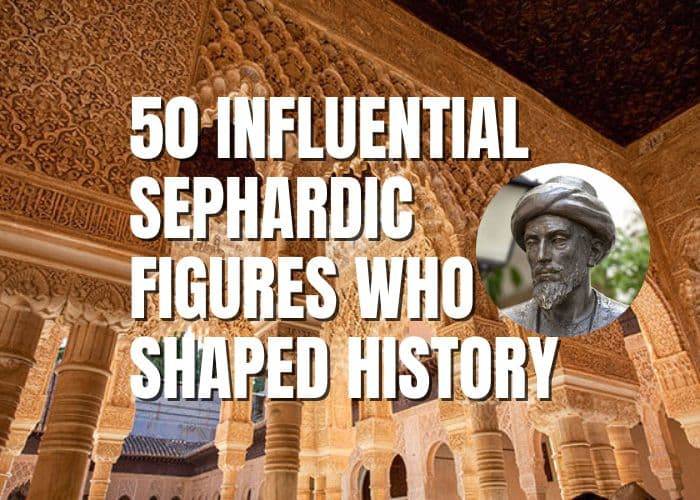Discover 50 influential Sephardic figures whose contributions have shaped the world. From art and literature to science and politics, the Sephardim have made significant contributions to human history. In this article, we highlight the achievements of 50 notable Sephardic individuals and explore the impact they have had on their respective fields. Join us as we celebrate the accomplishments of these influential figures and the enduring legacy of Sephardic culture.
Alright, without further ado, let’s dive into the fascinating world of 50 influential Sephardic figures and their contributions to various fields.
- Maimonides – philosopher, jurist, physician, and prolific writer of the Middle Ages
- Saadia Gaon – prominent Jewish philosopher, biblical commentator, and translator
- Moses ben Nachman (Nachmanides) – halachic authority and commentator on the Torah and Talmud
- Isaac Abravanel – philosopher, theologian, commentator, and statesman
- Judah Halevi – poet and philosopher, known for his influential work, The Kuzari
- Don Isaac Abarbanel – statesman, financier, and commentator on the Bible and Talmud
- Solomon ibn Gabirol – poet and philosopher, known for his influential work, The Fountain of Life
- Moses Cordovero – Kabbalist and author of The Palm Tree of Devorah
- Yosef Karo – author of the Shulchan Aruch, the most widely accepted code of Jewish law
- Shabbetai Zevi – claimed to be the long-awaited Jewish messiah in the 17th century
- Moses Mendelssohn – philosopher and one of the most important figures of the Jewish Enlightenment
- Benjamin Disraeli – British Prime Minister and novelist, known for his contributions to British politics and literature
- Emma Lazarus – poet and activist, best known for her poem “The New Colossus” inscribed on the Statue of Liberty
- Jacob ben Asher – halachic authority and author of the Arba’ah Turim
- Mordechai Kaplan – founder of the Reconstructionist movement in Judaism
- Yitzhak Navon – fifth President of Israel and author
- Samuel Ibn Tibbon – translator and commentator on the works of Maimonides
- David Ricardo – economist and member of the British Parliament, known for his theories on free trade and comparative advantage
- Daniel Kahneman – Nobel Prize-winning psychologist, known for his work on behavioral economics
- Marcel Proust – French novelist, known for his monumental work, In Search of Lost Time
- Antonio de Montezinos – Spanish explorer and converso, known for his reports of the Ten Lost Tribes of Israel in South America
- Henry Samueli – co-founder of Broadcom Corporation and philanthropist
- Lynn Schusterman – philanthropist and founder of the Schusterman Foundation
- Yves Saint Laurent – fashion designer, known for his contributions to haute couture
- David de Rothschild – banker, philanthropist, and member of the Rothschild family
- Amalia Rodrigues – Fado singer and actress, known as the “Queen of Fado”
- Isaac Louria – Kabbalist and founder of Lurianic Kabbalah
- Abraham ibn Ezra – poet, philosopher, and biblical commentator
- Baruch Spinoza – philosopher, known for his influential work, Ethics
- Gracia Mendes Nasi – Jewish philanthropist and diplomat during the Renaissance
- Gershom Scholem – scholar of Jewish mysticism and Kabbalah
- Isaac Bashevis Singer – Yiddish-language author and Nobel Prize winner
- Jacques Derrida – philosopher and literary theorist, known for his work on deconstruction
- Isaac Mizrahi – fashion designer and television personality
- David Levy Yulee – first Jewish member of the U.S. Senate and founder of the Florida Railroad
- Richard Falk – International law scholar and human rights activist
- Jacques Derrida – Philosopher and founder of deconstruction
- Azzedine Alaïa – Fashion designer
- Carlos Acosta – Ballet dancer and choreographer
- Maurice Béjart – Choreographer and ballet director
- Serge Haroche – Nobel Prize-winning physicist, contributed to quantum mechanics
- Salvador Luria – Nobel Prize-winning biologist, contributed to the study of bacteriophages
- Isaac Bashevis Singer – Nobel Prize-winning author, wrote in Yiddish and English
- Isaac Stern – Violinist and conductor
- Yves Montand – Actor and singer
- Marcel Marceau – Mime artist
- Marcel Pagnol – Author, playwright, and filmmaker
- Jacques Attali – Economist and advisor to French presidents
- Daniel Barenboim – Pianist and conductor
- Enrico Macias – Singer, songwriter, and peace activist.
The contributions of Sephardic Jews to various fields have been remarkable and influential. From philosophy and literature to science and music, these individuals have left an indelible mark on human history. While this list highlights only 50 of the countless notable Sephardic figures throughout the centuries, it serves as a testament to the rich and diverse heritage of Sephardic Jewry. By recognizing and celebrating these achievements, we honor their legacy and continue to be inspired by their contributions to the world.








Ohr HaChaim Yomi – Emor